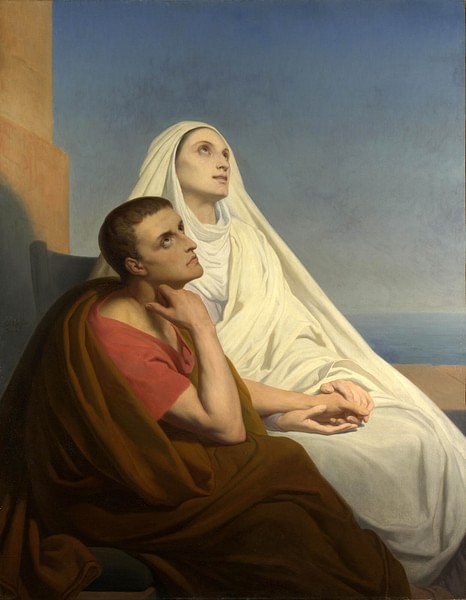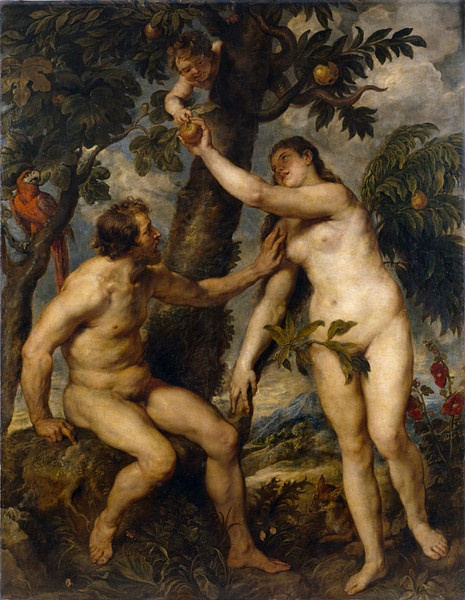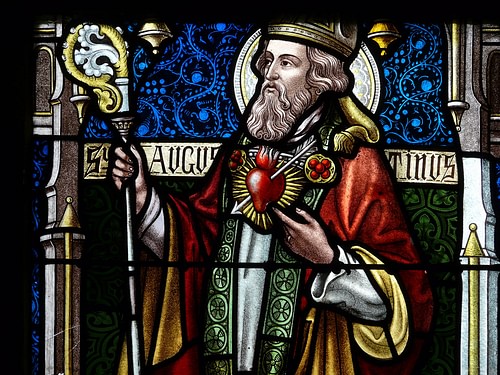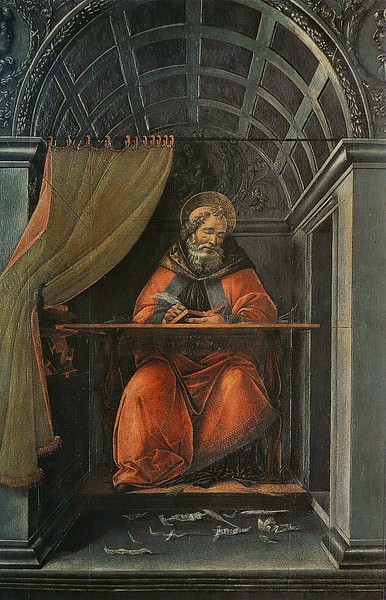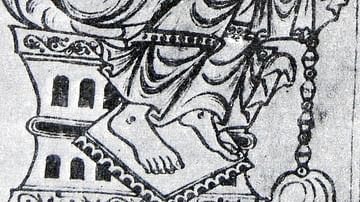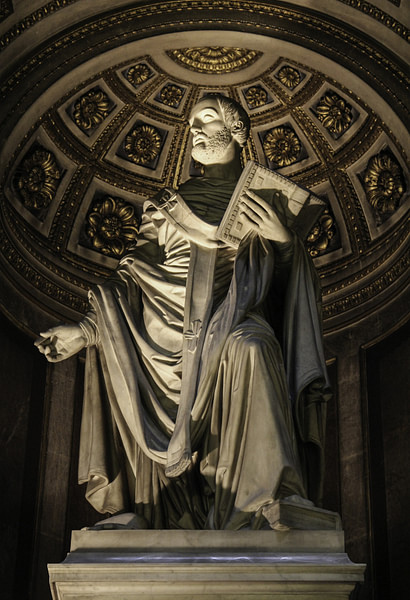
Aurelius Augustinus Hipponensis (354-430), better known as Augustine of Hippo, is extolled as the greatest of the Christian Church Fathers. More than any other writer, he developed what would become known as systematic theology, or an explanation of how Christianity fits into views of the universe, creation, and humankind's relationship with God.
When Martin Luther (1483-1546), a former Augustinian friar, protested against the Catholic Church, he created the Protestant Reformation utilizing the teachings of Augustine. Through the various Protestant denominations and their missions, the Christian Western tradition is indebted to the teachings of Augustine.
Two of Augustine's works are considered classics of Western literature: Confessions, which is deemed the first autobiography in the West, and City of God. Augustine left a catalogue that contains 113 books, 218 letters, and 500 sermons. His writings are among the most complicated of the Church Fathers because over the course of his life, he went back to a theological concept to update it as his thoughts evolved and he matured.
Early Life
Augustine was born in 354 CE in Thagaste, North Africa in the Roman province of Numidia, most likely in a family of Berber lineage. His father, Patrick, was a pagan, but his mother Monica, was a devout Christian. This was very common in the late Roman Empire. We do not know much about Patrick, but Monica was very ambitious for her son and admonished him to become a Christian to elevate his status. He must have been among what we deem the upper classes. Augustine had an excellent education in rhetoric, and education in schools of philosophy indicated leisure and funds to pursue such goals.
Upon Patrick's death in 370 CE, Augustine became a professor of rhetoric in Carthage. Joining some other intellectuals, he became interested in the Christian sect of the Manichaeans. A Persian Christian prophet, Mani (d. 254 CE), emphasized the polarity of good and evil along Zoroastrian and Gnostic philosophical principles. Although officially declared a heresy, the Manichaeans remained a popular sect in the Roman Empire and in the East along the Silk Road.
What may have drawn Augustine to this group was the allowance of two tiers of participants. Mani only required celibacy and diet restrictions from the leaders. The second tier, the 'hearers' of Mani, did not have to become ascetics. At this time, Augustine began a 15-year relationship with a woman. There were still class restrictions involving marriage in late antiquity. You could marry into a different class, but ideally, it had to be marrying up, never down. Apparently, this woman was of a lower class. They had a son together, Adeodatus ("gift of God"), who died young.
Disillusioned with his circle at Carthage, Augustine and Monica moved to Milan, Italy, where he won the position of rhetoric professor. Monica began negotiations for a marriage contract with a girl from a better family. Waiting for the girl to reach puberty, he established a relationship with another woman, as he later said, "because I was a slave to lust." It was in this period when he wrote, "Give me chastity and continence, but not just yet" (Confessions, Book 8.7).
Conversion
Augustine's conversion to Christianity in 386 CE became famous because he wrote about it in detail in the later Confessions (397 CE), a psychological retrospective of his life. An older Augustine analyzed the decisions he had made over time. Modern scholars tend to describe Augustine's search for meaning in life as an intellectual pursuit, rather than an emotional one. Nevertheless, the Confessions embodies a personal and spiritual struggle that is familiar to all humans.
The bishop of Milan was Aurelius Ambrose (339-397 CE), a prominent and famous theologian. Augustine was intellectually interested in Ambrose's sermons, and would later adapt much of this teaching in his ideas. After the sermon, he would sit on a bench outside waiting for his mother. One day he heard what he thought was a child playing a sing-song game, 'Take up and read." When he did not see anyone, he realized that it was a supernatural calling. He said he found a New Testament and opened it to Paul's letter to the Romans. It changed his life and he became a Christian.
Monica was delighted. However, Augustine was a perfectionist. If he was going to be a Christian, then he was going to be a celibate Christian. Canceling the marriage negotiations, Monica then died. This was traumatic for Augustine and perhaps contributed to what became his metaphysics of guilt (reatus), the basic idea of which was that God made everything from nothing, and each created thing is good, with natural faculties. All owe a debt to God for their creation. When they misuse their faculties (sin), this misuse results in guilt because of the debt.
Bishop of Hippo
In Hippo, Augustine was elected bishop, built his own monastery, and became renowned for his sermons and teaching. He often presented public debates in town hall meetings, where he addressed continuing heresies in the province. He renounced his former connections and debated against the Manichaeans.
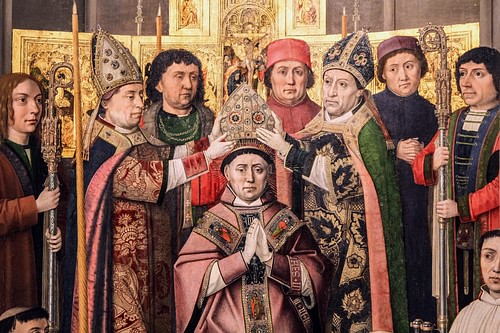
Augustine's commitment to celibacy never bothered him in the physical sense. He now had his own body under control. But as a perfectionist, Augustine continued to be bothered by the fact that he still thought about sexual intercourse. He assumed that such thoughts would go away with old age, but when a 70-year-old parishioner announced the birth of a son, he was dismayed. His struggles with why he could not control his thoughts on this and other matters, led to a more difficult question: Why do people continue to sin when they know better (at least intellectually)?
In one of the most famous sections of the Confessions, Augustine related an incident when he was a teenager. He and his friends broke into a neighbor's garden and stole some pears. He thought about this incident over and over – none of them was hungry, none of them was poor. Why did they do it? Paul the Apostle had struggled with the same problem:
Although I want to do good, evil is right there with me. For in my inner being I delight in God's law; but I see another law at work in me, waging war against the law of my mind and making me a prisoner of the law of sin at work within me. What a wretched man I am! Who will rescue me from this body that is subject to death? Thanks be to God, who delivers me through Jesus Christ our Lord! (Romans 7:21-25)
The Original Sin
Augustine, as a biblical exegete, and like so many other Christian intellectuals, turned to Genesis, the beginning of all creation, to analyze how evil came into the world and why humans sin. The Church Fathers of the 2nd century CE interpreted the story of Adam and Eve in the Garden of Eden to claim that Eve was seduced by the serpent (now the Devil in Christian theology), who then seduced Adam into disobedience. The seduction introduced the passion of lust (and shame) into human intercourse. However, this sin of lust was a necessary evil, to populate the world (and to grow the Church).
Augustine extended the concept through an idea that we term genetics. God created human genitals, and the first commandment was to be fruitful and multiply. Augustine claimed that this human activity originally was to be a natural function of humans, like walking or eating. The first couple's intercourse with lust produced a black stain on the soul of the first fetus, which was passed down to all humans. This introduced the Christian concept of human sexuality as sin, and without using the term, humans inherited a 'sin gene.' Located in the semen, it was transmitted to the woman, and so both were guilty. This was how Paul's 'law of sin' (power of sin) entered the human race. This became the doctrine of Original Sin.
Augustine's concept of Original Sin was an incredibly fatalistic view of humankind. He referred to humans as the 'condemned masses' because we are conceived in sin, and thus damned from the moment of conception. Baptism was required as the initiation ritual that admitted you to the Church to wash away this Original Sin, but it did not eliminate the human proclivity for evil. As he knew, baptized Christians (like himself) continued to sin in both body and mind.
Citing Paul again, he claimed that the only thing that can save humans is the grace of God (Greek: chairs, "gift") when God sent Christ into the world. This was truly a gift because humans, being condemned, could never achieve salvation on their own merits. Humans remain unreconciled without grace. Grace can only come from God (from outside the earth) as the world is totally corrupted by evil.
Evil arose from the human weakness of willpower in both physical and mental aspects: the desire to satisfy bodily instincts and the desire to disobey for its own sake (the way in which Augustine understood the stealing of the pears.) Sin is the inability to resist temptation. Matter itself is not evil, but overindulgence in matter and one's attitude toward matter can be evil. Humans are held responsible for evil and will be judged by God. Because God is omniscient (all-knowing), God already knows who will be saved and who will be damned. This idea was challenged by other bishops and Christian intellectuals.
Pelagius (354-418 CE), was a British monk who taught that when God created the first humans, he gave them free will because God did not want slaves (an idea not technically stated in Genesis). Humans are free to choose good and evil because of free will, not because of their inherent evil nature from conception. Augustine argued that God had given the first couple free will, but like immortality, it was also lost in Eden. Humans only have the freedom to choose evil; in relation to the good, God through grace, chooses them. Pelagius was condemned as a heretic in 415 CE, and so Augustine won the day.
The Donatists
After Constantine’s Conversion to Christianity in 312 CE, the bishops asked him to mediate a controversy among the churches. During the last persecution under Diocletian (302/306 CE), some bishops had committed apostasy by offering sacrifices to the gods of the Roman religion. Schism had resulted in the debate over whether or not to readmit these bishops to their former standing. Constantine made the decision to forgive and forget, in his larger goal of church unity.
Bishop Donatus of Rome did not agree. He literally moved his community to North Africa and created separate Donatist Churches. Donatus argued that Christian clergy must be faultless for their ministry to be effective and their prayers and sacraments to be valid. The church must be a church of saints, not sinners, and sacraments administered by any previous traditores (the compromisers) were invalid. Donatist clergy and monks, known as Circumcellions, attacked and robbed clergy living in high-life styles, distributed their money to the poor, and often attacked pagan shrines so that they would be arrested and executed to achieve martyrdom.
Augustine held a series of town hall meetings and campaigned against the Donatists. His response to the readmission of lapsed clergy was an analogy of Noah's Ark, just as the ark had both clean and unclean animals, so the Church will always have sinners and saints. The later Council of Trent (1545-1563), utilizing Augustine, taught that the value of the sacraments does not depend on the status of the celebrant, but on the worth of the victim and on the dignity of the chief-priest, Jesus Christ himself.
Bishop Ambrose had several run-ins with Emperor Theodosius I (r. 379-395 CE), at one point ex-communicating the emperor. Explaining this, Ambrose developed his idea of church-state relations; the state was created in Eden to carry out the dictates of the Church. Borrowing the same concept, in 410 CE, Augustine petitioned Emperor Honorius (r. 393-423) to send in the Roman army against the Donatists (citing Luke 16:23, "compel them to come in"). Donatist churches were destroyed and their clergy massacred. The slaughter at times was so great that even Augustine protested.
The Barbarian Invasions & The City of God
Augustine's struggles and reflections on personal spiritual enlightenment did not take place in a vacuum. Church councils continued to condemn existing heresies that often changed depending upon the beliefs of subsequent emperors. Many of the debates resulted in excommunications of bishops and often ended in violence. Augustine's attempts to present a coherent system based upon Christian adaptations to traditional philosophy and Roman culture focused on individual salvation in light of the evils of this age.
In the 5th century CE, the Roman Empire was besieged by continuing invasions of Goths, Visigoths, and Vandals. The trauma of the sack of Rome 410 CE by Alaric I, motivated remaining non-Christians to claim that it was the fault of Christians for angering the gods. Augustine's second great opus, On the City of God Against the Pagans (413-426 CE) was his response to these critics. Considered another classic in Western thought, Augustine finetuned his earlier writings on the suffering of the righteous, the existence of evil, the conflict between free will and divine omniscience, and the concept of Original Sin. Its value is found in his arguments for the superiority of Christian philosophy over other schools and his skill in summarizing and chronicling earlier philosophical treatises.
The book presented human history as a universal conflict between God and the Devil. The 'earthly city' is defined as one of corruption and evil, where people immerse themselves in the cares and pleasures of the present world, while the 'city of God,' a new Jerusalem, contains those who devote themselves to the eternal truth of God and the eventual heavenly realm for all believers.
Turning the criticism on its head, Augustine wrote that Christianity did not cause the sacking of Rome. The pagan gods often failed to protect Rome against disasters and military defeats such as the sack of Rome by the Gauls, 390 BCE. And despite their gods, Roman society had devolved into sexual immorality, corruption, and violence. Rather, God, in his foreknowledge, was responsible for the successes of Rome. He knew that Roman military victories and expansion, with those imperial roads and the conversion of Constantine, would provide a coherent system for the conversion and salvation of the empire.
Just War Theory
The City of God contains what became known as 'just war theory.' To decide whether a war was morally justifiable, Augustine applied the criteria of the right to go to war and right conduct in a war. He reviewed ancient traditions and philosophical writings on war as he developed his views. He concluded that individuals should not commit violence on their own. God gave the sword to governments, validated by Paul in his letter to the Romans 13:4:
For the one in authority is God's servant for your good. But if you do wrong, be afraid, for rulers do not bear the sword for no reason. They are God’s servants, agents of wrath to bring punishment on the wrongdoer.
Augustine's 'just war theory' was reviewed and adapted for centuries where it most likely influenced the later Geneva Conventions (1939-1945) that addressed war crimes, the protections for prisoners of war, and the treatment of civilians during wartime.
The City of God was instrumental with the later scholastics and humanists of the Middle Ages. Both Anselm of Canterbury (1033-1109) and Thomas Aquinas (1225-1274) applied Augustinian arguments to their ideas of merging faith with reason.
Augustine died in 430 CE, with the Vandals at the gates of Hippo. Augustine lamented not the invasion per se, but that the Vandals (Arian Christians) were heretics. He ordered his monks to protect his library, which was transferred to Europe and beyond. He was canonized as a saint by popular acclamation and declared a Doctor of the Church by Pope Boniface VIII in 1298.

